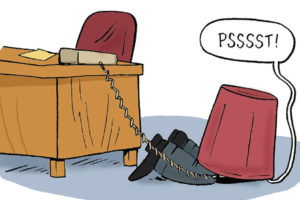By Virginia Hulme
Professionalism discussions often feature Precept 13 and the actuary’s obligation to report apparent, unresolved, material violations of the Code of Professional Conduct to the Actuarial Board for Counseling and Discipline (ABCD). But little is said about the last Precept of the Code—Precept 14.
Precept 14 requires actuaries to “respond promptly, truthfully, and fully to any request for information by, and cooperate fully with, [the ABCD] in connection with any disciplinary, counseling, or other proceeding of such body relating to the Code … subject to applicable restrictions on Confidential Information and those imposed by Law.” It should be noted that Precept 14 applies to anyone who receives a request for information from the ABCD, whether a complainant, subject actuary, or anyone who may have relevant information.
Both Precepts are key to maintaining the self-regulation of the actuarial profession. Precept 13 requires possible violations of the Code to be brought to light; Precept 14 allows them to be fully and fairly investigated. Without complete information, the ABCD would not be able to investigate possible violations and recommend discipline when appropriate. The ability of the profession to enforce the Code of Professional Conduct—and by extension the U.S. Qualification Standards and the actuarial standards of practice—is essential to maintaining the trust of the public in the profession’s ability to regulate itself.
Once a complaint is submitted to the ABCD, Precept 14 becomes very important. When a complaint is submitted, that complaint is sent to the subject actuary (the actuary about whom the complaint was made). The subject actuary is expected to respond in a professional and timely manner. The ABCD chairperson and vice chairpersons review the complaint and the subject actuary’s response and decide whether to dismiss the complaint, offer mediation, or arrange for an investigator. Of course, one possible outcome of cooperating fully from the outset could be to show that there was no violation, and the case would be dismissed.
Let’s say a case goes to investigation. At that point, the subject actuary is expected to cooperate fully with the investigator appointed by the ABCD. The investigator’s report is sent to the ABCD and the subject actuary, who has 30 days to respond. The ABCD reviews the investigator’s report and the subject actuary’s response and decides whether to dismiss the case, provide counseling, obtain additional information, or conduct a hearing.
If a hearing is conducted, the subject actuary is expected to cooperate with the scheduling, attend the hearing, and participate in a professional manner. After considering all the information, the ABCD may decide to seek additional information, dismiss the matter (if there is no material violation), counsel the subject actuary, or recommend discipline.
At each stage of the process, the subject actuary has an opportunity to cooperate. The ABCD often considers the subject actuary’s cooperation (or lack thereof) at each stage of the process when deciding how far to proceed in a case, whether to recommend discipline, and, if so, what kind of discipline. It therefore benefits the subject actuary to cooperate fully and promptly. When a violation has occurred, subject actuaries who cooperate, acknowledge their mistakes, show remorse, and come up with a plan to avoid such mistakes in the future tend to receive counseling or a recommendation of discipline less harsh than those in similar situations who refuse to cooperate. (Obviously, the ABCD’s recommendation depends greatly on the severity of the violation, not just on the subject actuary’s attitude and willingness to cooperate.)
So, if you ever find yourself the subject of a complaint and the ABCD comes calling, we strongly recommend you respond promptly, truthfully, and fully. One former subject actuary wrote about their experience1 and what they learned from it. I leave you with a quote from that anonymous actuary:
“In order to keep our profession healthy and independent, we must be willing to bring differences of opinion to light—and we must be willing to discipline our own. We must also be willing to defend our work and accept consequences if our defense is not successful. As a result of going through the disciplinary process, I am a better actuary.”
VIRGINIA HULME is manager of professionalism content at the Academy.
Endnote
- “The ABCD Process From the Inside”; Contingencies; November/December 2015.





